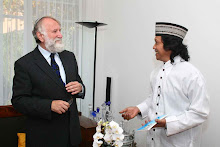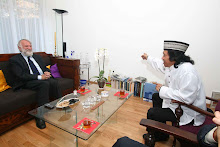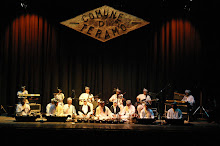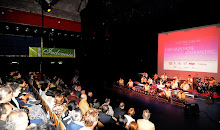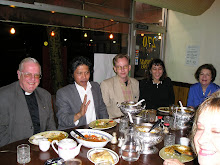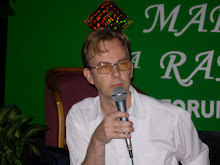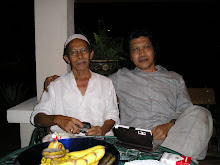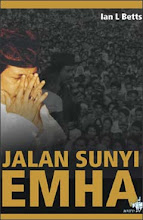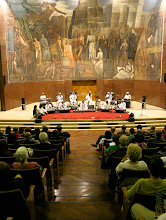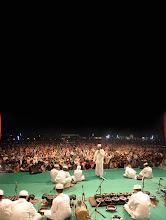If you have enjoyed The Silent Pilgrimage, you might be interested to see the new blog, "The Sea of Veils", which is dedicated to the translation of Emha's works:
Emha Ainun Nadjib: "The Sea of Veils"
This blog deals with the work of Emha Ainun Nadjib and is a companion to The Silent Pilgrimage [http://thesilentpilgrimage.blogspot.com/]. Both tell the story of Indonesian writer and touring artist Emha Ainun Nadjib. The Silent Pilgrimage gathers materials on his life and work. This blog will carry translations of his work for readers all over the world and for the promotion of tours. "The Sea of Veils" is one of Emha's best known works in Indonesia. I hope you enjoy it! Thank you, Ian L. Betts.
http://theseaofveils.blogspot.com/
Saturday 22 August 2009
Friday 22 May 2009
An extremely creative teacher, friend and brother
For me Cak Nun is a travelling library. He is an extremely creative teacher, friend and brother. His understanding of politics, social affairs, the economy and culture is as broad as his understanding of sport, especially football. And his grasp of diversity is unique and authentic.
As well as being an intellectual and cultural expert, as a poet Cak Nun occupies a very special position. In the 70s people were shocked at his performance poetry, which was conducted with gamelan onstage. And then, the performances of “Syair Lautan Jilbab”[1] in Makassar (Sulawesi, or the Celebes), attended by audiences of 15,000.
And what makes me so respectful is his consistency in defending the marginalised and the poor. His loyalty and solidarity stand out. I was once stuck for words during a discussion in 1990 in Yogyakarta and Cak Nun helped me with his intelligent contribution, full of wisdom.
[1] Verses from The Sea of Veils
By Jose Rizal Manua, award-winning dramatist, cultural observer and writer.
Translated by Ian L. Betts
As authentic today as when he first spoke
This figure is one of only a few who have managed to engage my inner being. His courage to differ in a difficult and turbulent environment makes me sure that he has something inside.
His empathy with the masses and his capacity for communication with them on abstract themes in their own language style amazes me, because he is also highly thought of by the elite. Cak Nun’s words are as authentic today as they were when he first spoke. This is the important thing to note in a ‘true’ leader. God willing, Cak Nun is included among them.
For me, until this day, Cak Nun is identified with the song "Tombo Ati," which always soothes my heart and brings tears to my eyes.
Tony B. Trihartanto
Head of the Perbanas College for Economics, Jakarta
Notes:
Tony appeared and spoke at a Kenduri Cinta gathering late in 2005 at Taman Ismail Marzuki, Cikini, Jakarta, the night that we were joined by the whirling sufi dancers who, seated at random among the crowd, would rise whirling with the music .
For "Tombo Ati", please see post entitled "Poetry ...Tombo Ati, The Heart's Ease" below.
Translated by Ian L. Betts
Thursday 21 May 2009
A Voice of Accusation and an Icon of Cultural Creativity
The existence of Cak Nun[1] has given renewed hope to an appreciation of arts and culture in a dimension that liberates man from the schackles of various forms of oppression, ignorance and injustice.
Cak Nun serves as the well-spring which frees people from the snares of fearfulness, allowing the development of a cultural stream which variosu aspects whereby socio-reality is raised to become transcendental, returning to earth in a form of artistic creativity encompassing the whole of humanity.
Consequently, I believe that the struggle taken by Cak Nun involves not only the fundamentals of culture as a condition for the creation of an awareness that will free those who are marginalised, but also offers hope for the ascendance of creativity as a God-given gift, which only has meaning if a way can be found for the struggle to overcome all forms of ignorance, injustice and all that preys on the dignity of man, including a review of the cultural system of Indonesia.
Seen from the political dimension, what Cak Nun does comprises the integration of “individualism in culture” as one aspect of the three-seats of power of Bung Karno[2], where religion is the fundament.
I hope that Cak Nun, as a figure, will always grow, until he is not only an icon of artistic and cultural creativity, but becomes a voice of accusation arising from all forms of matters concerning this country. I am proud, because Cak Nun belongs not only to the Muslim community, but has symbiotically interpreted the meaning of the diversity of Indonesia in the frame of the Unitary Republic.
[1] As Emha is affectionately known
[2] Affectionate term for Indonesia’s first President, Soekarno.
By Choirul Sholeh Rasyid Member of the People’s Representative Assembly for the National Awakening Party (PKB)
An architect of the now...
He is a Wali[1] of Allah...an architect of "the now" with both a sense of history and a vision of the future of humanity. His informal "love" offers a solidity both courageous and ”thankful.”
[1] Wali: Islamic religious term denoting a spiritual guide, guardian, holy person, saint, or one endowed with the highest spiritual values, most often associated also with leadership, such as the legendary Wali Songo of Java who are thought to have promulgated Islam throughout Indonesia.
By Gus Mono, a respected Muslim cleric from Magelang, Java
Translated by Ian L. Betts
Steps on the Journey
Praise be to God for His mercy and guidance. All praise and greetings to our Prophet Muhammad PBUH, his companions, followers and descendants.
One’s history, and the background to it, influences a person’s individuality. With one’s individuality, a person can make history.
From what I know of Emha Ainun Nadjib, without any embellishment whatsoever, he is a figure who has carved out a role in the centre of the plural peoples, based on his strong individuality.
Strong in his principles, he is able to endure facing the trials of life, however bitter they may be.
Fearful only of Allah, and hopeful only of His grace, he is inclusive without exception, especially with regard to the poor, the marginalised and the disenfranchised.
The development of his most important thought is in accord with his passion for leading the Qu’ran recitals at Pondokan Modern Daarussalam Gontor. He is sensitive towards all and dislikes the use of force by or against anyone.
Everyone has an interest in self-promotion, but the degree and extent of this varies from one to another. I see that Emha’s interest in self-promotion and the process involved in gaining it is minimal, but he achieves maximum results.
I predict that the contents of this book are among the steps in Emha’s journey towards positioning himself on the world's stage, with the blessing of his wisdom.
[1] A renowned Islamic Madrassah-style boarding school
By Hasan Abdullah Sahal
Leader of Pondok Modern “Darussalam” Gontor Ponorogo[1]
March 12th 2006
Translated by Ian L. Betts
Discourse flavoured with Islam, and a spirit at once local and global
I love his poetic works, especially Muhammadkan Hamba, which causes the adrenalin to flow in the middle of the frozen socio-political situation at this time. The spirit of Cak Nun’s thought represents the "Awakening of Majapahit/Nusantara[1]” with a discourse flavoured with Islam, and a spirit at once local and global, indicating the enthusiasm for Allah’s mercy on earth as well as unity in diversity. That’s unlike me, who represents Sunda[2] with the language of a Liberal ’disbeliever’ (kafir). It’s clear that the audience at Kenduri Cinta, who share different religions and ideologies, also respect communities outside of the mainstream, such as Jakar (Jaringan Kafir Liberal – Liberal Kafir Network), and that these can be bridged by Cak Nun. It’s time for Cak Nun, via your Success Team, to go for National Leadership, because this country needs Alternative Leaders, Progressive, Artistic and Liberal, not the normative, standard, ignorant and permanently hypocritical.
[1] Ancient maritime and archipelago-based empire based on the territory of what is now much of present-day Indonesia
[2] Sunda, a people, territory and language of West Java
Note:
Kenduri Cinta: literally the feast of love; the name of the monthly gathering (or Maiyah) held since 2000 in Jakarta on the evening of the second Friday of each month at Taman Ismail Marzuki, Cikini, Central Jakarta
By Dadang Ismawan, Painter and theologian, Jakar (Jaringan Kafir Liberal – Liberal Kafir Network)
Translated by Ian L. Betts
Subscribe to:
Posts (Atom)
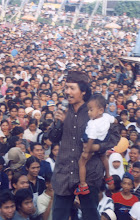


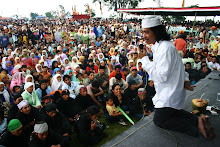



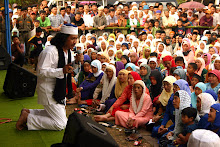


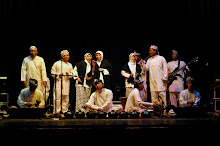


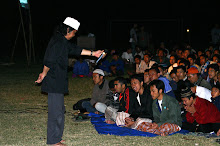
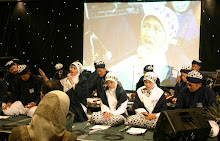
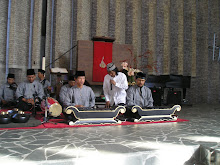
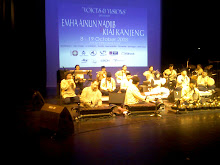

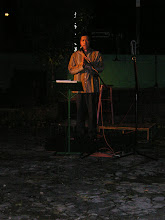
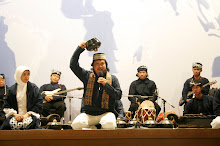


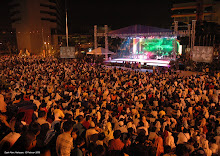
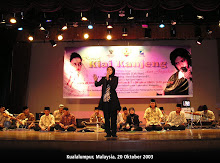
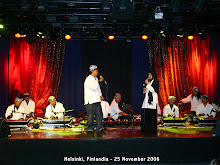.jpg)

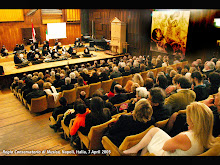

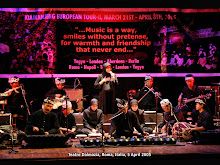
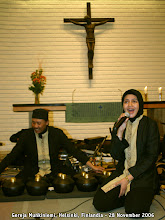.jpg)

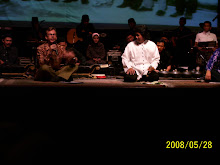.jpg)
